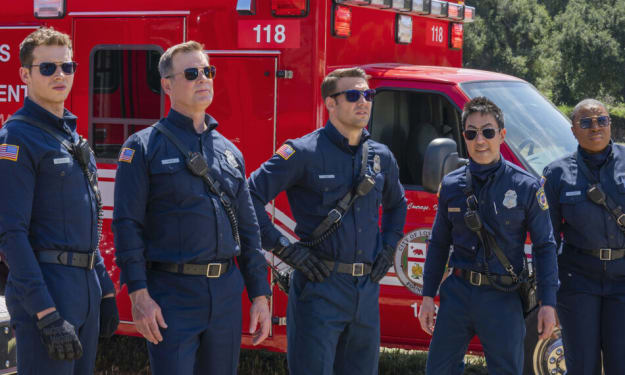Stephen King & the Ambiguously Gay Trope
A Look into One of Stephen King's Most Classic Writing Tropes: the Ambiguously Gay Duo

The collected work of Stephen King reads as a who’s who of strange monsters, bone-chilling villains, and the characters created within the cycle of his classic tropes. King is not only famous for his unique way with words and amazingly horrific stories but also for his staple line-up of tropes/vintage plot devices and characteristics. Authors and writers are bound to have their own assorted line-up of personal tropes or stereotypes. King’s are a huge part of the charm he has as a writer and storyteller. They act as a familiarity to let the reader know the novel their reading is a true King masterpiece. It’s part of what makes the man so great and his work so special. Most of King’s readers or fans of his films are able to recognize some of his more well-known character tropes. Most notably in his writing one can easily find a religious character, an alcoholic, a writer, childhood bullies and more. One that flies under the radar but is very apparent in his work are the undertones of homosexuality between chosen characters. Looking at characters from just three of King’s most popular stories; The Body, The Long Walk, and IT, it becomes clearer to see this interesting character relationship/trait that has been included in multiple stories of his.
The pair of characters that are not only stand-outs in the story they were created for but also fit the ambiguously gay stereotype are Gordie Lachance and Chris Chambers. The young characters originate from the iconic 1982 story, The Body. Which is the story of four young friends going to find the body of a missing kid who was presumed dead, set in Maine (another trope within itself) in 1960. What lies between these two characters is unarguably different from the other relationships explored within the other main characters, Teddy Duchamp & Vern Tessio. In fact, one of the more prominent themes of the novella is the point that Chris and Gordie hold a sense of maturity over their two more childlike friends. Not only does their dialogue suggest such, but it also emphasizes their isolated relationship that stems from it. Between these two boys is a sense of love, care and respect that is lacking in their personal lives. Something that is without a doubt special.
Chris truly wants the absolute world for Gordie, going as far as to say, “It’s like God gave you something, all those stories you can make up, and he said: This is what we got for you kid. Try not to lose it. But kids lose everything unless somebody looks out for them and if your folks are too fucked up to do it then maybe I ought to” (King pg. 381). The quote suggests a caring devotion the young man has for his friend. Chris and Gordie have an isolated attachment to each other that is not carried over with their other friends as demonstrated with, “We both dated in high school, but no girl ever came between us. Does that sound like we went faggot? It would to most of our old friends, Vern and Teddy included.” (King pg. 434). These two boys have something significantly unique that neither Teddy nor Vern could completely understand. “I’ve explained about Chris, I think; my reasons for clinging to him were less definable.” (King pg. 435). And possibly, they themselves did not fully comprehend it either.
An earlier work from King, or Bachman as he is credited with in this copy, also contributes some interesting content for the undertones of homosexuality. 1979’s The Long Walk, set in a dystopian future, in which the plot revolves around men in a demanding walking contest. The most obvious character to analyze for this point would have to be, Peter McVries, who appears to hold feelings for Garraty more aligned with romance. This feeling extending friendship becomes more and more apparent as the story unfolds due to the fact that he continuously flirts with him. He also appears to be dead-set on saving his life more than a few times despite refusing to keep that going, “I won’t let you kill yourself, Ray! (King pg. 403). At one point, McVries even asks Garraty, “Would you let me jerk you off?” (King pg. 386). And this could easily be misinterpreted as just desperation for sexual contact on McVries end, considering all the men were going through that during the long walk. But it’s notable that McVries does not seem to be seeking the pleasure for himself, as all the other men were, instead he asked to quote on quote, ‘jerk Garraty off,’ rather than the other way around. Within the context of the story, McVries comes of as a bisexually coded character with a soft spot for Garraty. “Just go on dancing with me like this forever, Garraty, and I’ll never tire. We’ll scrape our shoes on the stars and hang upside down from the moon.” (King pg. 214). An ambiguous endearing speech to the man that ends with “He blew Garraty a kiss and walked away’ (King pg. 214).
The other end of this relationship is Garraty who appears to be straight at first but an odd pattern begins with him. Throughout the pages, Garraty is not afraid to mention his childhood friend, Jimmy Owens. Who is later explained to have participated in an incident of Garraty’s childhood. “Jan was gone. Her face became that of Jimmy Owens, the kid down the block from them. He had been five and Jimmy had been five and Jimmy's mother had caught them playing Doctor's Office in the sandpit behind Jimmy's house. They both had boners.” (King pg. 233) Garraty is not afraid to continually think about that or bring it up, just as before as Jimmy replaced his girlfriends face in a vision or when he tries to explain it to McVries. “I had a friend once. And he and I-we took off our clothes-” (King pg. 401). He also earlier briefly compared of Jimmy & McVries, wondering if Jimmy had a scar like McVries does. Perhaps the final nail in the coffin to show just how much the two of them cared for each other was in McVries last moments where Garraty was unwilling to lose him. When McVries decides that it’s time for him to sit, Garraty is against it instantly. He screams and attempts to physically pick him up but can’t. And his final instinct is to offer himself instead in pure desperation to save him. “NO! ME! ME! Shoot me!” (King pg. 432). But it’s to no avail and McVries is killed but not without one last sweet moment between the two. “McVries opened his eyes and smiled again. The next instant, he was gone.” (King pg. 432).
One of King’s most iconic books of his career so far has been IT, which is his 1986 story of seven child outcasts and their experiences being terrorized by an entity known as IT that exploits the fears & phobias of its victims. Within the pages of this large book lies two of the seven main characters who appear to have a chemistry dynamic all their own. Eddie Kaspbrak also seems to be a gay coded character. One of the most obvious examples contributing to said idea is that IT, or Pennywise, exploits Eddie’s fear of germs through the form of a leper. Which proceeds to say things like “I’ll do it for a dime” or “I’ll blow you for free” (King pg. 291) to the young boy. This possibly means Eddie has an underlying fear of a hidden sexuality that he might even be fully aware of himself. And one of the most convincing contributors to this idea is that King wrote some interesting similarities for Eddie to have in common with the IT victim, Adrian Mellon who was said to be gay. “The victim was gay and rather child-like man named Adrian Mellon. He had a bad case of asthma.” “Eddie’s hand stole out and touched the side of his aspirator.” (King pg. 477).
And perhaps one of the most interesting details to this horror novel is not something scary at all, but the chemistry Eddie holds with Richie Tozier, fellow member of The Losers Club. Between the two of them is something different and sweet that pops up all throughout the book. Be it with Richie’s consistent ways to remind Eddie of how cute he is; pinching his cheeks and going “Cute, cute, cute!” (King pg. 288). Or when Eddie is complaining about his doting aunts; “That’s cause they know how cute you are Eds-just like me. I saw what a cutie you were the first time I met you.” (King pg. 331). Richie consistently expresses overly sweet things like that to Eddie and Eddie alone. And one of the stand-out quotes between the two that makes the reader think King had to have done this on purpose is the scene in which Eddie asks Richie for a lick of his rocket. “How about a lick on your rocket?” “Your mom wouldn’t approve, Eddie. “Reluctantly, Richie held his Rocket up to Eddie’s mouth and snatched it away quickly.” (King pg. 919). It’s such an offbeat and odd line that plays out almost as having a double meaning. Going into the more painful side, the scene of Eddie’s death is very upsetting. Eddie’s last words had been for Richie. Who was especially heartbroken and goes on a little tangent about how they can’t leave Eddie alone in the dark when everyone decided they should leave his body in the sewers. “They put him down, and Richie kissed Eddie’s cheek. Then he blindly looked up at Ben.” “You’re Sure?” (King pg. 1054).
Stephen King has created a huge and wonderful collection of stories so far in his career and in the pages lie beautifully crafted characters that may hold more than it seems at first. Looking at three of his works is just a small analyzation into this ‘Ambiguously Gay’ trope that seems to appear every now and then. Exploring these pairs of characters surfaces the idea that there could be romantic chemistry between them, be it intended or accidental by King himself. Though it’s up for debate, Chris & Gordie, McVries & Garraty, and Richie & Eddie are some of Stephen Kings stand-out characters when it comes to this trope and there is definitely more that can be said for each of them. But among the long list of Stephen King tropes, this remains one of the most interesting ones to explore.
About the Creator
Jaime Burbatt
My name is Jaime, I'm 24 years old & my dream is to be an author






Comments
There are no comments for this story
Be the first to respond and start the conversation.